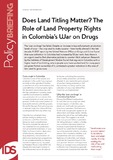| dc.contributor.author | Muñoz-Mora, Juan Carlos | |
| dc.contributor.author | Tobón, Santiago | |
| dc.contributor.author | d’Anjou, Jesse Willem | |
| dc.coverage.spatial | Colombia | en |
| dc.date.accessioned | 2018-09-07T09:17:31Z | |
| dc.date.available | 2018-09-07T09:17:31Z | |
| dc.date.issued | 2018-09 | |
| dc.identifier.citation | Muñoz-Mora, J.C.; Tobón, S. and d’Anjou, J.W. (2018) 'Does Land Titling Matter? The Role of Land Property Rights in Colombia’s War on Drugs', IDS Policy Briefing 156, Brighton: IDS | en |
| dc.identifier.issn | 1479-974X | |
| dc.identifier.uri | https://opendocs.ids.ac.uk/opendocs/handle/20.500.12413/14051 | |
| dc.description.abstract | The ‘war on drugs’ has failed. Despite an increase in law enforcement, production levels of coca – the crop used to make cocaine – have hardly altered in the last decade. A 2017 report by the United Nations Office on Drugs and Crime found that coca cultivation in Colombia had increased by 52 per cent; thus, there is an urgent need to find alternative policies to counter illicit behaviour. Research by the Institute of Development Studies found that regions in Colombia with a higher level of land titling, where people who have worked land for many years are given formal ownership of it, witnessed a greater reduction in the area of
land used to grow coca. | en |
| dc.description.sponsorship | European Commission | en |
| dc.language.iso | en | en |
| dc.publisher | IDS | en |
| dc.relation.ispartofseries | IDS Policy Briefing;156 | |
| dc.rights.uri | http://www.ids.ac.uk/files/dmfile/IDSOpenDocsStandardTermsOfUse.pdf | en |
| dc.subject | Agriculture | en |
| dc.subject | Security and Conflict | en |
| dc.title | Does Land Titling Matter? The Role of Land Property Rights in Colombia’s War on Drugs | en |
| dc.type | IDS Policy Briefing | en |
| dc.rights.holder | IDS | en |
| dc.identifier.team | Conflict | en |
| rioxxterms.funder | Default funder | en |
| rioxxterms.identifier.project | Default project | en |
| rioxxterms.version | VoR | en |
| rioxxterms.funder.project | 9ce4e4dc-26e9-4d78-96e9-15e4dcac0642 | en |

